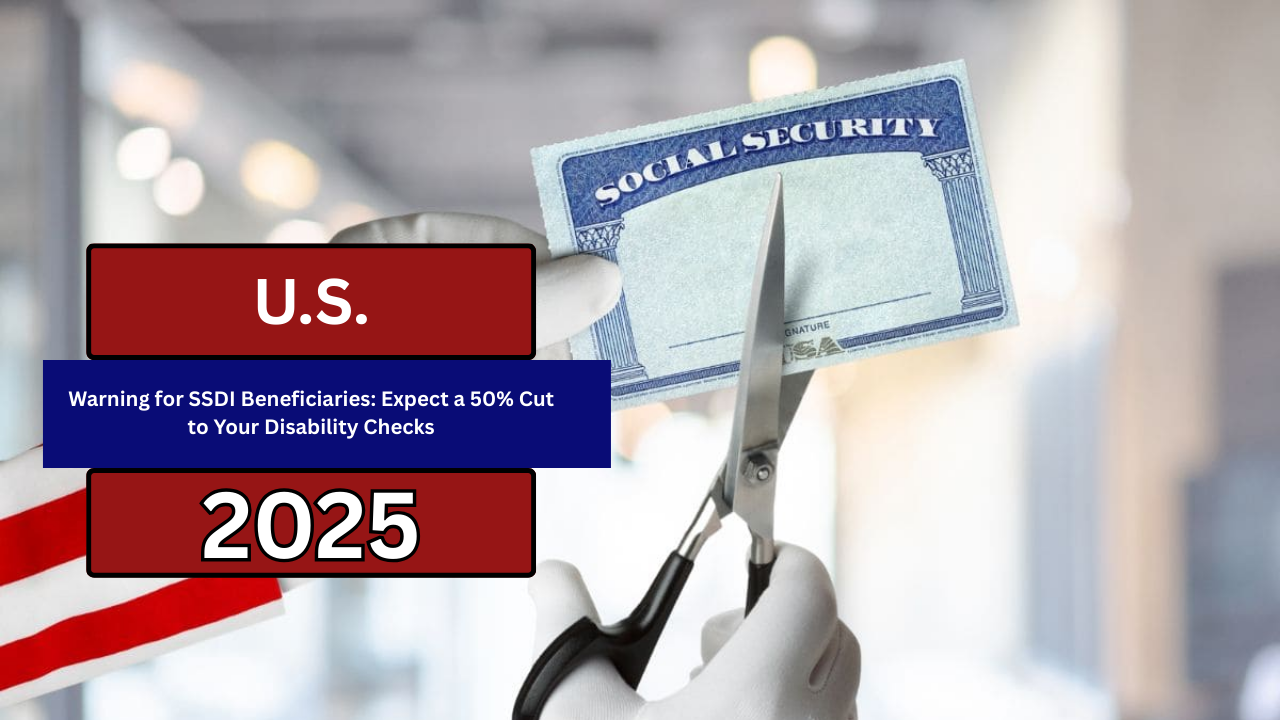Starting April 25, individuals who have received a notice of overpayment related to Title II benefits—including Social Security Disability Insurance (SSDI), survivor benefits, and retirement benefits—will experience a significant and automatic 50% deduction from their monthly checks.
With the maximum benefit for these recipients in 2025 exceeding $4,000, this policy will mean that many beneficiaries will see their payments cut in half, leaving them with only $2,000 a month.
This deduction is part of an effort to recover overpaid amounts, often stemming from administrative delays, processing errors, or changes in personal circumstances that were not promptly reported.
Unfortunately, the impact of these deductions is far-reaching, as many beneficiaries depend on their monthly payments to cover essential living costs such as rent, groceries, and utilities.
While the policy aims to recover overpaid funds, it is being met with serious concerns about the financial hardship it will impose on those already struggling to make ends meet.
A Disastrous Situation for SSDI Recipients
For those who rely on Social Security Disability Insurance (SSDI), this new policy is particularly troubling. SSDI payments are vital for individuals who have been unable to work due to disabilities.
Many of these individuals have limited financial resources, and the sudden loss of half of their monthly income could push them to the brink of financial instability.
The decision to deduct 50% of SSDI payments stems from overpayments that were made in previous months, and while the Social Security Administration (SSA) is working to recover these funds, the consequences for beneficiaries are dire.
As Kate Lang, director of federal income security at Justice in Aging, pointed out, the loss of half of one’s monthly income is devastating for people who rely on those funds for their daily survival.
“It’s better not to lose all your income,” Lang stated. “But if you rely on those benefits to pay rent or buy food, losing half is still devastating. Some people could end up homeless.”
This stark reality underscores the vulnerability of SSDI recipients, whose lives could be thrown into chaos by an administrative mistake or a delay that led to an overpayment in the first place.
Many individuals receiving SSDI have already struggled with financial instability due to their inability to work, and this policy only deepens that strain.
The Consequences Extend Beyond SSDI Recipients
While SSDI recipients are the primary focus of this new policy, retirees and survivors who are receiving Social Security benefits under Title II are also at risk of experiencing similar cuts.
The same rules for overpayments apply to them, meaning that they could also lose up to 50% of their monthly income if overpayments are identified.
Retirees and survivors, who are often living on fixed incomes, may find it even more difficult to absorb these cuts. For many, these benefits represent the primary source of financial support after years of hard work and savings.
A sudden reduction in payments can force them to make tough choices, such as cutting back on essential expenses like medicine, food, or utilities.
It’s important to recognize that not all individuals who receive these benefits have the financial cushion to absorb such a drastic reduction in their income. Retirees, for example, may have limited savings and could struggle to manage day-to-day living costs with reduced income.
What Are the Alternatives for Beneficiaries?

Fortunately, there is some recourse for beneficiaries who are facing these steep deductions. Individuals who receive a notice of overpayment have a 90-day window to request a reconsideration, a waiver, or to negotiate a lower withholding rate. However, if they fail to act within these 90 days, the SSA will proceed with the automatic 50% withholding.
This tight timeline adds to the pressure on recipients, who may already be dealing with difficult financial situations. Many may not fully understand the notice they receive or may struggle to navigate the complex process of requesting reconsideration or appealing the deduction.
Moreover, beneficiaries who miss the deadline may face even worse consequences, leaving them without the option to avoid the 50% withholding. This lack of flexibility creates an additional layer of hardship for those who are already living on the edge financially.
The Impact on Supplemental Security Income (SSI) Recipients
The impact of the new policy isn’t limited to SSDI recipients. Those who receive Supplemental Security Income (SSI)—a program designed to assist low-income individuals, including children, the elderly, and people with disabilities—will face a different, but still significant, challenge. For SSI recipients, the withholding rate for overpayments will remain at 10%.
While this is a lower withholding rate compared to SSDI recipients, the reality for SSI beneficiaries is still troubling. Even a 10% reduction in monthly payments can make it difficult to meet basic needs, such as purchasing groceries, paying for medicine, or covering rent.
The SSI program often serves the most vulnerable members of society, and cutting payments, even by a smaller percentage, can severely affect their quality of life. SSI recipients are typically living in poverty or near poverty, and their financial safety nets are already extremely limited.
Pushback Against the Policy
Richard Fiesta, executive director of the Alliance for Retired Americans, criticized the previous proposal of a 100% withholding as “draconian and cruel.” While the new 50% withholding is a step back from this extreme measure, Fiesta warned that it could still create an economic crisis for beneficiaries.
“The sudden and drastic change in withholding rates over the past 100 days has caused uncertainty and stress for beneficiaries,” he said. This shifting policy only adds to the confusion and anxiety many recipients are already feeling.
Fiesta’s comments reflect widespread concern that the SSA’s policy is failing to take into account the financial fragility of many recipients, particularly those on fixed incomes or living with disabilities.
The Need for Reform
This situation highlights the need for reform within the Social Security system. While the government must recover overpaid benefits, the current system seems to be placing undue hardship on vulnerable citizens who rely on Social Security payments for their survival.
Advocates for Social Security reform argue that the government must take steps to ensure that recipients are not punished for administrative mistakes or delays.
There should be clearer guidelines on how overpayment recovery is handled and more transparency in the process. Additionally, the government should consider offering more flexible repayment options that do not disrupt the financial stability of recipients.
Moving Forward
The 50% withholding policy is a significant concern for many people who depend on Social Security benefits, especially those who are already financially vulnerable.
While there are options for reconsideration or lower withholding rates, the pressure is mounting on beneficiaries to act quickly and navigate a complex system. The consequences of inaction are severe, as many individuals will face financial instability, and some may even risk homelessness.
As the situation unfolds, it is important for lawmakers and advocacy groups to continue pushing for reform and to ensure that those who depend on Social Security benefits are not further harmed by these policies. Social Security recipients deserve a system that provides stability, fairness, and the opportunity to live with dignity.



